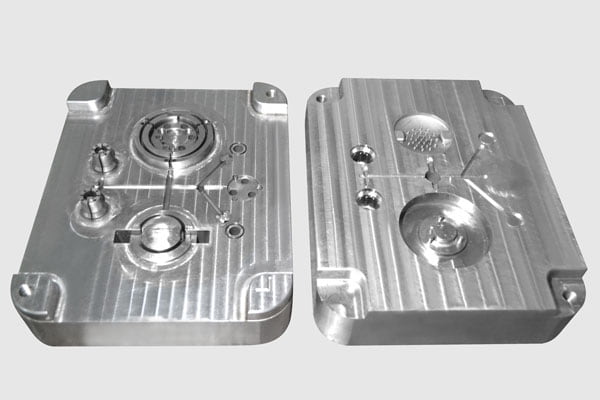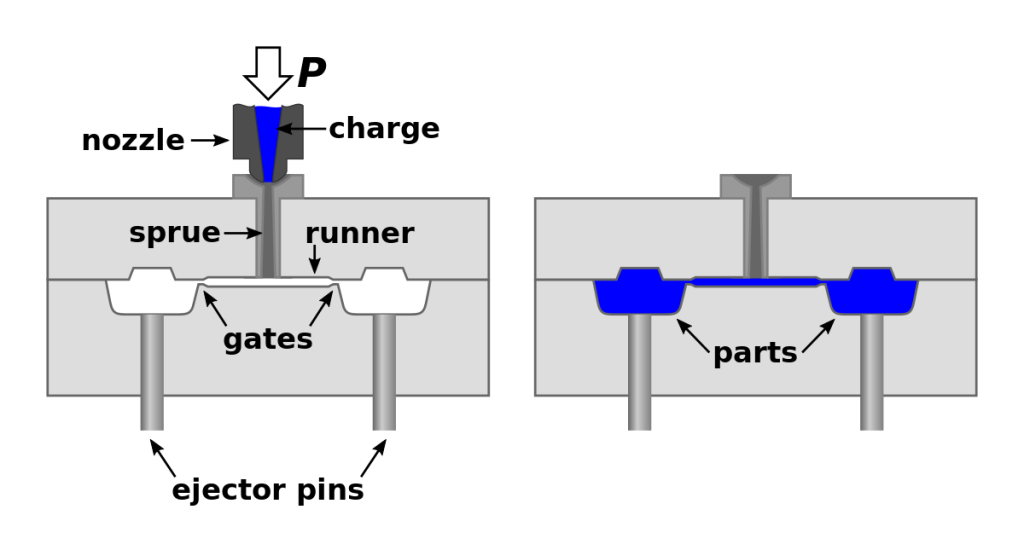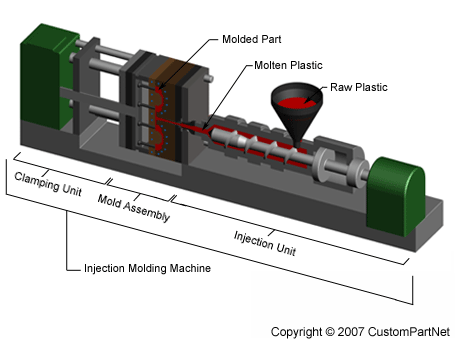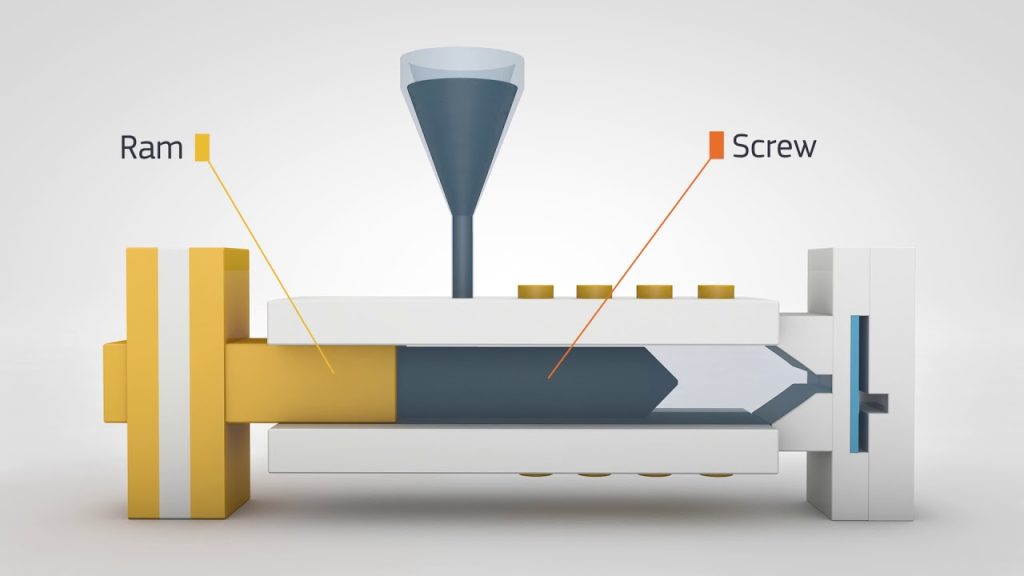Table of Contents
Have you ever wondered if aluminum can be injection molded? This question has been a topic of discussion in the manufacturing industry for quite some time. Injection molding is a widely used manufacturing process for producing high volumes of identical parts. However, it is commonly associated with plastics. In this article, we will explore the possibility of aluminum injection molding and its benefits.
Can Aluminum Be Injection Molded?
Aluminum is a widely used material in various industries, including automotive, aerospace, and construction. It is known for its strength, durability, and lightweight properties. However, can aluminum be injection molded? This is a question that many people ask, and the answer is yes. In fact, aluminum injection molding is a popular manufacturing process that is used to produce a wide range of products, including automotive parts, electronics, and medical devices.
What is Aluminum Injection Molding?
Aluminum injection molding is a manufacturing process that involves injecting molten aluminum into a mold cavity. The molten aluminum is forced into the mold at high pressure, which helps to ensure that the final product has a smooth surface finish and accurate dimensions. The mold is then cooled, and the aluminum solidifies into the desired shape. The final product is then removed from the mold, and any excess material is trimmed away.
Aluminum injection molding is a highly efficient process that is capable of producing complex shapes with tight tolerances. It is also a cost-effective alternative to other manufacturing processes, such as die casting and machining. Additionally, aluminum injection molding allows for the production of large quantities of parts with consistent quality.
The Benefits of Aluminum Injection Molding
There are several benefits to using aluminum injection molding as a manufacturing process. Firstly, it allows for the production of complex shapes with tight tolerances, which can be difficult to achieve with other manufacturing processes. Secondly, it is a cost-effective alternative to other processes, such as die casting and machining. Thirdly, it is a highly efficient process that allows for the production of large quantities of parts with consistent quality. Finally, aluminum injection molding is an environmentally friendly process that produces less waste than other manufacturing processes.
Another benefit of aluminum injection molding is that it allows for the production of lightweight parts. Aluminum is known for its lightweight properties, and this is an important factor in industries such as automotive and aerospace. Lightweight parts can improve fuel efficiency, reduce emissions, and improve performance.
Aluminum Injection Molding vs. Die Casting
Die casting is another popular manufacturing process that is used to produce aluminum parts. However, there are some differences between die casting and aluminum injection molding. Firstly, die casting is a more expensive process than aluminum injection molding. Secondly, die casting produces parts with a thicker wall thickness than aluminum injection molding. Finally, die casting is not as efficient as aluminum injection molding when it comes to producing large quantities of parts.
On the other hand, aluminum injection molding produces parts with a thinner wall thickness, which can reduce weight and improve performance. Additionally, aluminum injection molding is a more efficient process for producing large quantities of parts. Finally, aluminum injection molding allows for the production of complex shapes with tight tolerances, which can be difficult to achieve with die casting.
The Applications of Aluminum Injection Molding
Aluminum injection molding is used in a wide range of industries, including automotive, aerospace, and electronics. In the automotive industry, aluminum injection molding is used to produce parts such as engine blocks, transmission cases, and suspension components. In the aerospace industry, it is used to produce parts such as aircraft frames, landing gear, and engine components. In the electronics industry, it is used to produce parts such as heat sinks, housings, and connectors.
Aluminum injection molding is also used in the medical industry to produce parts such as surgical instruments, implants, and medical devices. The ability to produce complex shapes with tight tolerances makes it an ideal manufacturing process for medical applications.
The Future of Aluminum Injection Molding
Aluminum injection molding is a rapidly evolving manufacturing process that is constantly improving. Advances in technology have led to the development of new materials and processes that are more efficient, cost-effective, and environmentally friendly. Additionally, the demand for lightweight parts in industries such as automotive and aerospace is driving the development of new aluminum alloys that are stronger and lighter than traditional alloys.
Overall, the future of aluminum injection molding looks bright. It is a versatile and efficient manufacturing process that is capable of producing complex shapes with tight tolerances. As technology continues to improve, it is likely that aluminum injection molding will become even more popular in industries such as automotive, aerospace, and electronics.
Conclusion
Aluminum injection molding is a highly efficient and cost-effective manufacturing process that is capable of producing complex shapes with tight tolerances. It is a popular manufacturing process that is used in a wide range of industries, including automotive, aerospace, and electronics. The ability to produce lightweight parts with consistent quality makes it an ideal process for industries such as automotive and aerospace. As technology continues to improve, it is likely that aluminum injection molding will become even more popular in the future.
Frequently Asked Questions
Here are some common questions and answers regarding the injection molding of aluminum:
Can aluminum be injection molded?
Yes, aluminum is one of many metals that can be injection molded. The process involves melting the aluminum and injecting it into a mold under high pressure. However, the process is more difficult than injection molding plastic due to the high melting point of aluminum and the need for specialized equipment.
To successfully injection mold aluminum, it is important to use the right equipment and mold design. The mold needs to be made of a material that can withstand the high temperatures of the molten aluminum, such as steel or copper alloys. Additionally, the injection molding machine needs to have enough pressure to inject the aluminum into the mold and fill all the cavities. Overall, aluminum injection molding requires expertise and experience to ensure success.
What are the benefits of aluminum injection molding?
Aluminum injection molding offers several benefits over other manufacturing methods. First, it allows for complex shapes to be created with high precision and accuracy. Second, it offers a high strength-to-weight ratio, making it ideal for lightweight parts that require strength and durability. Finally, it can be cost-effective for high-volume production runs since the process can be automated and produce consistent parts.
However, there are also some drawbacks to aluminum injection molding. The process can be more expensive than other methods due to the specialized equipment and expertise required. Additionally, the lead time for creating the molds can be longer than other manufacturing methods. Despite these drawbacks, aluminum injection molding remains a popular choice for creating high-quality, complex metal parts.
What industries use aluminum injection molding?
Several industries use aluminum injection molding to create high-quality, precise metal parts. The automotive industry is one of the biggest users of aluminum injection molding, particularly for creating lightweight engine components and structural parts. The aerospace industry also uses the process to create complex parts with high precision and accuracy. Finally, the medical industry uses aluminum injection molding to create devices and instruments that require high strength and precision.
Overall, any industry that requires complex, precise metal parts can benefit from aluminum injection molding.
How does aluminum injection molding compare to other metal manufacturing methods?
Aluminum injection molding has several advantages over other metal manufacturing methods. First, it allows for complex shapes to be created with high precision and accuracy. Second, it offers a high strength-to-weight ratio, making it ideal for lightweight parts that require strength and durability. Finally, it can be cost-effective for high-volume production runs since the process can be automated and produce consistent parts.
Other metal manufacturing methods, such as casting or forging, may be better suited for creating simpler shapes or larger parts. Additionally, these methods may not offer the same level of precision and accuracy as aluminum injection molding. Ultimately, the choice of manufacturing method depends on the specific requirements of the part and the industry it is being used in.
What are some common applications of aluminum injection molding?
Aluminum injection molding has a wide range of applications in various industries. In the automotive industry, it is commonly used to create engine components, transmission parts, and structural parts. In the aerospace industry, it can be used to create complex parts for engines, landing gear, and other components. In the medical industry, it is used to create devices and instruments that require high precision and strength.
Overall, aluminum injection molding can be used to create any metal part that requires high precision, accuracy, and strength. Its versatility and ability to create complex shapes make it a popular choice in various industries.
In conclusion, aluminum injection molding is a viable option for manufacturers looking for a lightweight, durable material with excellent heat conductivity. While it may not be as widely used as other materials such as plastic or steel, advancements in technology and the ability to produce complex shapes make it a promising choice for certain applications.
However, it is important to note that aluminum injection molding requires specialized equipment and expertise. Therefore, finding a qualified manufacturer with experience in aluminum injection molding is crucial to ensure a successful outcome.
Overall, as the demand for lightweight and high-performance materials continues to grow, aluminum injection molding is likely to become an increasingly popular choice for a wide range of industries. Its unique properties and benefits make it an attractive option for manufacturers looking to produce high-quality products.
Request a quote today!
[contact-form-7 id="1578" title="Contact form"]
Please compress the file into a ZIP or RAR file before uploading. Alternatively, send through your RFQ by email.
enquires@unitymanufacture.com





